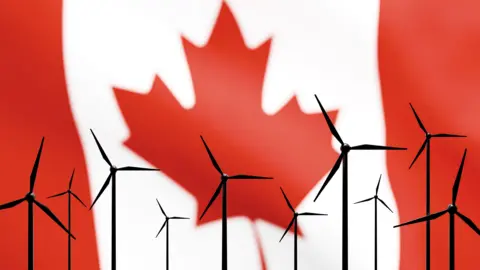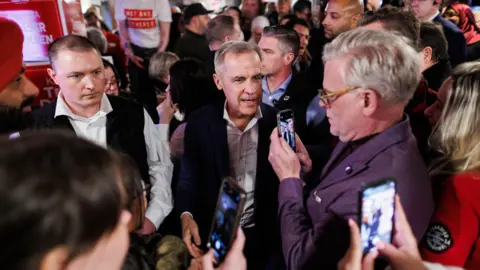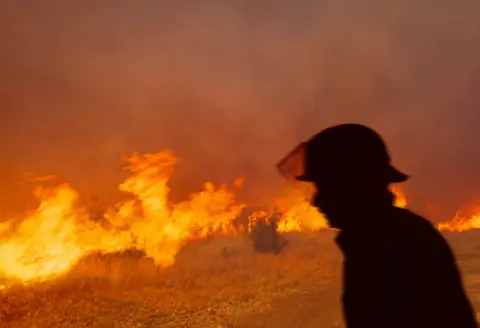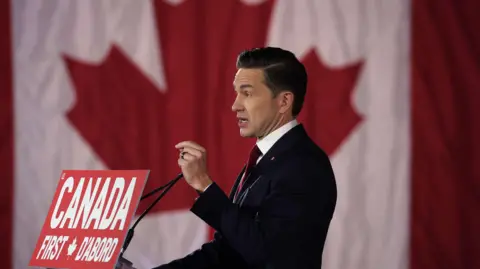 Getty Images
Getty ImagesAs the threat posed by US President Donald Trump tops Canada’s federal election agenda, the issue of the country’s contribution to global warming has been largely overshadowed.
The two main contenders are pushing plans for new energy infrastructure as the country seeks to pivot away from its reliance on the US.
Mark Carney’s Liberals are promising to make Canada a global superpower in both conventional and green energy. The Conservatives under Pierre Poilievre want to invigorate the oil and gas sector and scrap the industrial carbon tax.
It’s a big shift from the 2021 election, when the environment topped the list of voter concerns.
 Getty Images
Getty ImagesIn that vote, there was a consensus between the two major parties that Canada should rapidly transition to a green economy, with a net-zero emissions law passed in June of that year.
That sense of unity is now long gone.
Carney, who became leader of the Liberals and prime minister in early March, has a long track record as an international champion of climate change.
As well as being a governor of the Bank of England, he was a UN Special Envoy on climate action and finance and was co-chair of the Glasgow Financial Alliance for Net Zero, one of the big outcomes of COP26.
However, his first action as prime minister was to repeal the consumer carbon levy.
The tax – a signature climate policy of the governing Liberals – was introduced in 2019, and placed an added charge on consumers using coal, oil or gas products.
It was unpopular, and for the Conservatives it became an easy target of blame for the rising cost of living in recent years. Poilievre even sought to paint his rival as “Carbon Tax Carney”.
Some observers believe that cancelling the tax was a smart political move, others feel it was a mistake.
“By making one of your first moves the removal of the carbon price, you’re accepting this narrative that climate change policy costs us too much money and isn’t good for us, when, in fact, that is not the case,” said Catherine Abreu, who is director of the International Climate Politics Hub and a member of Canada’s Net Zero Advisory Body.
“I think there’s a missed opportunity here to set a new narrative framework around this in the election.”
Carney’s election pitch on energy is to turn Canada into “a world leading superpower in both clean and conventional energy”.
He is emphasising his pragmatic approach, and his campaign talks about fast-tracking green energy projects and encouraging green transport and buildings, without giving too many details. He has also called for investment in technologies like carbon capture.
There are other important factors that have helped cool some of the Carney climate rhetoric.
Opinion polls indicate that, since late 2023, Canadian concerns over the climate fell as worries over rising prices, energy and housing costs came to the fore.
The war in Ukraine has also put new emphasis on the country’s bountiful natural resources in oil, gas and critical minerals.
“We have had a parade of geopolitical allies turning up on our doorstep saying, we want your rocks, we want Canada to be the geopolitically secure primary resource commodity provider, in place of Russia,” said Mark Winfield, a professor in the faculty of environmental and urban change at Toronto’s York University.
“And that’s created another sort of dynamic in all of this, which was not present in previous elections.”
 Getty Images
Getty ImagesPierre Poilievre is the man seeking to replace Carney as PM.
He is running on cost of living issues, and advocating for tougher policies on law and order and what he considers “woke” cultural issues.
Poilievre, whose party has a strong voter base in energy-rich regions of the country, is pushing for a major expansion of the oil and gas industries and the removal of the carbon tax on industry.
While he has remained tight-lipped on whether he supports Canada’s net-zero goals, he has argued that it would be better for the world if India and other Asian countries were to replace “dirty coal” with cleaner Canadian oil and gas.
According to Prof Winfield, the Conservative proposals to boost oil and gas is likely to prove attractive to voters, even if the merits of expanding production don’t stand up to scrutiny.
 Reuters
ReutersHe told the BBC it’s more “at the in-principal level as a response to Trump, as opposed to any real thinking through of what are the implications on climate, and whether this is actually economically viable”.
Regardless of climate or energy, the key question in the minds of voters in this election is which leader is best placed to deal with the combative US president.
That is especially important when it comes to the oil and gas industry.
Canada is America’s largest foreign supplier of oil, with around 90% of crude production heading south of the border, and the impact of energy tariffs could well be disastrous for jobs and the economy.
“Our relationship with the US has completely changed,” Carney said last week in the first of two election debates.
“The pipelines are a national security problem for us.”
That concern over US dependence has revived interest in pipelines that would move oil and gas from the western provinces, where they are mainly produced, to the east, where they could be exported to new overseas markets.
A previous attempt called the Energy East pipeline was shelved in 2017 due to a number of factors, including fierce opposition from some regions of the country and regulatory hurdles.
In this campaign, both the Liberals and Conservatives have promised to fast track “energy corridors”, though Carney has flip-flopped on his support for pipelines, knowing they are deeply unpopular with environmentalists.
He is trying to walk a fine line between defending Canada as a nation under threat from Trump, and taking action on a warming climate.
The Insurance Bureau of Canada reported that in 2024, there were C$8.5bn ($6.1bn; £4.6bn) in weather-related insured losses, triple the figure for 2023.
And while all the two election frontrunners are advocating a major role for a fossil fuels in Canada’s economy, this approach will clash head on with the country’s climate commitments.
Yves-François Blanchet, leader of the Bloc Québécois, a federal party based in Quebec, has accused the pair of being in a “denial situation about climate change”.
“I’m sorry to crash your party guys, but you are telling fairy tales” about clean oil and gas, he said in last week’s debates.
Canada has promised on the international stage to curb carbon emissions by 40-45% by 2030 based on the levels in 2005.
As of 2023, carbon output was only down 8.5%.
Whoever wins the election will have a real challenge to square that circle.
Canadians go to the polls on 28 April.



